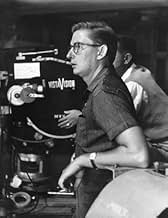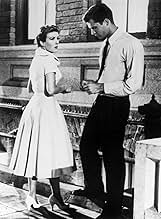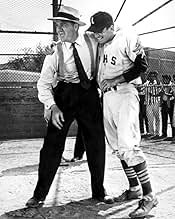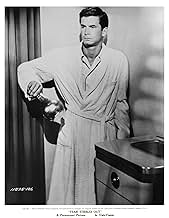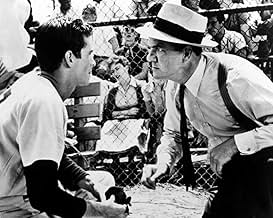AVALIAÇÃO DA IMDb
6,9/10
2,2 mil
SUA AVALIAÇÃO
Adicionar um enredo no seu idiomaTrue story of the life of Jimmy Piersall, who battled mental illness to achieve stardom in major league baseball.True story of the life of Jimmy Piersall, who battled mental illness to achieve stardom in major league baseball.True story of the life of Jimmy Piersall, who battled mental illness to achieve stardom in major league baseball.
- Prêmios
- 1 indicação no total
John Aberle
- Ballplayer
- (não creditado)
Eric Alden
- Policeman
- (não creditado)
Heather Ames
- Nurse
- (não creditado)
Sam Balter
- Broadcaster
- (narração)
- (não creditado)
Mary Benoit
- Nurse
- (não creditado)
John Benson
- Reporter
- (não creditado)
Don Brodie
- Reporter Evans
- (não creditado)
Richard Bull
- Reporter Slade
- (não creditado)
Bart Burns
- Joe Cronin
- (não creditado)
Edd Byrnes
- Boy in Car Assisting Jimmy Up Stairway
- (não creditado)
Wade Cagle
- Intern
- (não creditado)
Keith Coyne
- Baby
- (não creditado)
Enredo
Você sabia?
- CuriosidadesThe real Jimmy Piersall disowned the movie due to its distortion of the facts. Based on the success of his autobiography and the movie, Piersall penned a second book in 1985 called The Truth Hurts, which detailed his ousting from the White Sox organization.
- Erros de gravaçãoClose-up shots of Jimmy Piersall playing shortstop and right field reveal a low outfield wall backed by trees in the background. These games were supposed to be in Fenway Park, which would have a high left field wall and bleachers in right field.
- Citações
Jim Piersall: I don't care what happens. I love you Mary!
- ConexõesFeatured in Diamonds on the Silver Screen (1992)
Avaliação em destaque
As a previous reviewer said Anthony Perkins did not exactly look like Frank Merriwell out on the field during the baseball scenes, but the film is about the true story of Boston Red Sox centerfielder Jimmy Piersall who sustained a nervous breakdown and then came back to have a pretty respectable major league career.
Showing the personal road Piersall took towards that breakdown is where Anthony Perkins gives one of his great film performances. This film is a lot like I'll Cry Tomorrow where Jo Van Fleet was pushing the career of her daughter Susan Hayward as Lillian Roth so she could have the success that her daughter had vicariously.
That's where the other great performance in the film comes in. Karl Malden is the baseball father, someone with the same dreams, that his son become a major league ballplayer. Malden's success involved being on his factory team, he wanted more and when he couldn't have it drove his son relentlessly to learn the skills and make the grade. But it was some price for Piersall to pay.
I remember Jimmy Piersall as a player when I was a lad. He played for the Red Sox in the years of the Casey Stengel Yankee juggernaut. He was a good contact hitter, didn't hit much for power, but played a flawless centerfield. The Red Sox in the Fifties had little to cheer about. There was a pitching staff of Mel Parnell and a bunch of nobodies. There infield was from hunger with the exception of third baseman Frank Malzone who came up in 1956 the last year Parnell played. But the outfield gave New England something to cheer about with Piersall in center, Jackie Jensen in right, and Ted Williams playing with his back to the Green Monster in left. Piersall covered so much ground in center field he made it real easy on both Williams and Jensen. The Red Sox let him go to the expansion Los Angeles Angels in 1961 where he finished his career. Still he's a Red Sox legend.
The story had been previously done on TV's Climax Theater with Tab Hunter as Piersall. In his recent memoirs Tab said that he had hoped to do the screen version. At the time he was involved in a relationship with Anthony Perkins. Unbeknownst to Hunter, Perkins lobbied and got the part in the film. That sort of put a damper on the relationship.
I also echo other reviewers in wishing that some of Piersall's teammates and others in the Red Sox organization had been portrayed. Only Joe Cronin who was the General Manager at the time is shown on the screen. Legendary owner Tom Yawkey is not portrayed and that is a pity.
Interestingly enough Piersall may have gotten his chance with the Red Sox because of Joe Cronin's racist policies. The Red Sox were the last team in the major leagues to integrate. I remember that very well when Pumpsie Green became their first black player two years after Fear Strikes Out was released.
Fear Strikes Out is unfortunately a two person show with Perkins and Malden the only really developed characters in the film. But those are two very talented persons indeed.
Showing the personal road Piersall took towards that breakdown is where Anthony Perkins gives one of his great film performances. This film is a lot like I'll Cry Tomorrow where Jo Van Fleet was pushing the career of her daughter Susan Hayward as Lillian Roth so she could have the success that her daughter had vicariously.
That's where the other great performance in the film comes in. Karl Malden is the baseball father, someone with the same dreams, that his son become a major league ballplayer. Malden's success involved being on his factory team, he wanted more and when he couldn't have it drove his son relentlessly to learn the skills and make the grade. But it was some price for Piersall to pay.
I remember Jimmy Piersall as a player when I was a lad. He played for the Red Sox in the years of the Casey Stengel Yankee juggernaut. He was a good contact hitter, didn't hit much for power, but played a flawless centerfield. The Red Sox in the Fifties had little to cheer about. There was a pitching staff of Mel Parnell and a bunch of nobodies. There infield was from hunger with the exception of third baseman Frank Malzone who came up in 1956 the last year Parnell played. But the outfield gave New England something to cheer about with Piersall in center, Jackie Jensen in right, and Ted Williams playing with his back to the Green Monster in left. Piersall covered so much ground in center field he made it real easy on both Williams and Jensen. The Red Sox let him go to the expansion Los Angeles Angels in 1961 where he finished his career. Still he's a Red Sox legend.
The story had been previously done on TV's Climax Theater with Tab Hunter as Piersall. In his recent memoirs Tab said that he had hoped to do the screen version. At the time he was involved in a relationship with Anthony Perkins. Unbeknownst to Hunter, Perkins lobbied and got the part in the film. That sort of put a damper on the relationship.
I also echo other reviewers in wishing that some of Piersall's teammates and others in the Red Sox organization had been portrayed. Only Joe Cronin who was the General Manager at the time is shown on the screen. Legendary owner Tom Yawkey is not portrayed and that is a pity.
Interestingly enough Piersall may have gotten his chance with the Red Sox because of Joe Cronin's racist policies. The Red Sox were the last team in the major leagues to integrate. I remember that very well when Pumpsie Green became their first black player two years after Fear Strikes Out was released.
Fear Strikes Out is unfortunately a two person show with Perkins and Malden the only really developed characters in the film. But those are two very talented persons indeed.
- bkoganbing
- 8 de abr. de 2006
- Link permanente
Principais escolhas
Faça login para avaliar e ver a lista de recomendações personalizadas
- How long is Fear Strikes Out?Fornecido pela Alexa
Detalhes
- Data de lançamento
- País de origem
- Idioma
- Também conhecido como
- Fear Strikes Out
- Locações de filme
- Empresa de produção
- Consulte mais créditos da empresa na IMDbPro
- Tempo de duração1 hora 40 minutos
- Cor
- Proporção
- 1.85 : 1
Contribua para esta página
Sugerir uma alteração ou adicionar conteúdo ausente

Principal brecha
By what name was Vencendo o Medo (1957) officially released in Canada in English?
Responda

